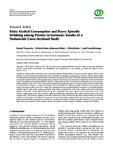Risky Alcohol Consumption and Heavy Episodic Drinking among Parents in Germany: Results of a Nationwide Cross-Sectional Study
Varnaccia, Gianni
Manz, Kristin
Zeiher, Johannes
Rattay, Petra
Lange, Cornelia
Introduction. Risky alcohol consumption (RAC) and heavy episodic drinking (HED) by parents can have negative effects on their children. At present, little is known about these forms of alcohol consumption among parents in Germany. The aim of this analysis is to estimate the percentage of parents living in Germany who practise RAC and HED and to study associations between these consumption patterns and sociodemographic factors. Material and Methods. The data basis comprises the data of the nationwide studies “Gesundheit in Deutschland aktuell” (GEDA) of 2009, 2010, and 2012. The data were collected by means of computer-assisted telephone interviews (CATI). Our analysis included all participants living in a household with at least one child of their own under 18 years of age (n = 16,224). Information on RAC and HED was collected using the AUDIT-C screening instrument. Logistic regression models were used to study the relationship between parental alcohol consumption and sociodemographic variables. Results. 18.4% of the mothers and 29.6% of the fathers exhibited RAC; 8.4% of the mothers and 21.0% of the fathers practised HED. After mutual adjustment, RAC showed a significant association with the level of education, income (only mothers), employment status (only mothers), migration background, relationship status (only mothers), and the age of the youngest child. HED showed a significant association with income (only mothers), the age of the youngest child (only mothers), and the level of education (only fathers). Conclusions. The presented analysis emphasizes the relevance of preventive measures to reduce parental alcohol consumption. In addition to universal interventions, risk group-specific measures (e.g., for parents with high income) are needed to reduce parental alcohol consumption and thus support a healthy development of children.

